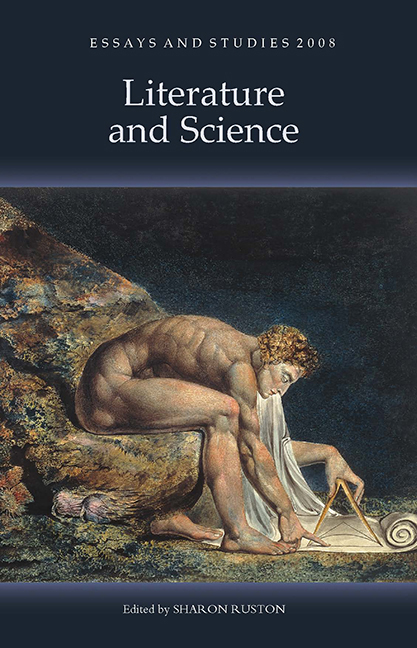Book contents
- Frontmatter
- Contents
- List of Illustrations
- Acknowledgements
- Notes on Contributors
- Introduction
- 1 From Popular Science To Contemplation: The Clouds Of The Cloud Of Unknowing
- 2 ‘Dreams And Plain Dotage’: The Value Of The Birth Of Mankind (1540–1654)
- 3 Natural Rights And Natural History In Anna Barbauld And Mary Wollstonecraft
- 4 George Eliot, Geometry And Gender
- 5 On The Back Of The Light Waves: Novel Possibilities In The ‘Fourth Dimension’
- 6 Le Fanu's ‘Carmilla’, Ireland, And Diseased Vision
- 7 Evolution, Literary History And Science Fiction
- 8 ‘The Luxury Of Storytelling’: Science, Literature And Cultural Contest In Ian Mcewan's Narrative Practice
- Index
3 - Natural Rights And Natural History In Anna Barbauld And Mary Wollstonecraft
Published online by Cambridge University Press: 12 February 2019
- Frontmatter
- Contents
- List of Illustrations
- Acknowledgements
- Notes on Contributors
- Introduction
- 1 From Popular Science To Contemplation: The Clouds Of The Cloud Of Unknowing
- 2 ‘Dreams And Plain Dotage’: The Value Of The Birth Of Mankind (1540–1654)
- 3 Natural Rights And Natural History In Anna Barbauld And Mary Wollstonecraft
- 4 George Eliot, Geometry And Gender
- 5 On The Back Of The Light Waves: Novel Possibilities In The ‘Fourth Dimension’
- 6 Le Fanu's ‘Carmilla’, Ireland, And Diseased Vision
- 7 Evolution, Literary History And Science Fiction
- 8 ‘The Luxury Of Storytelling’: Science, Literature And Cultural Contest In Ian Mcewan's Narrative Practice
- Index
Summary
INTHIS ARTICLE I explore the ways that two writers, Anna Barbauld and Mary Wollstonecraft, used animals and natural history to push for natural rights. In the late eighteenth century cruelty to animals was a significant issue for those on all sides of the political spectrum, from radicals and dissenters to the socially and politically conservative Evangelical thinkers, such as William Wilberforce and Hannah More, who were against slavery and animal suffering but who did not argue for rights for all. Barbauld used animals to promote rights for dissenters, while Wollstonecraft explicitly used natural rights to argue for equality for women. The role of animals in these debates is often complex but also revealing of the political agenda of vulnerable or disenfranchised groups.
During the Romantic period a number of voices began talking insistently about ‘natural rights’, the rights that everyone had simply because they were alive. These rights became enshrined in the new republics emerging at this time: the American Declaration of Independence (signed on 4 July 1776) stated ‘all men are created equal; they are endowed by their Creator with certain inalienable rights; that among these are life, liberty and the pursuit of happiness’. These rights are described as ‘the laws of nature’ (White 2006, 5). In 1789, the French Declaration of the Rights of Man and of the Citizen stated ‘Men are born and remain free and equal in rights’; these natural, inalienable and even ‘sacred’ rights are defined as ‘liberty, property, security, and resistance to oppression’ (White 2006, 5). 1788 had been the centenary of the so-called ‘Glorious Revolution’ and English writers drew comparisons, both favorable and unfavorable, between the settlement reached between the monarch and people then and the events in France. Some radicals felt that the rights that had been given to Englishmen then had subsequently been lost, and that these rights needed to be restored; others felt that the changes of 1688 had not gone far enough. The understanding that there were rights which every person should expect and that should govern how people were treated is one that today we take for granted.
- Type
- Chapter
- Information
- Literature and Science , pp. 53 - 71Publisher: Boydell & BrewerPrint publication year: 2008
- 3
- Cited by

